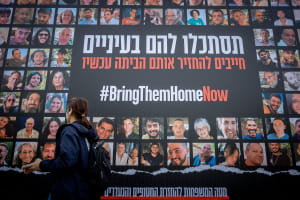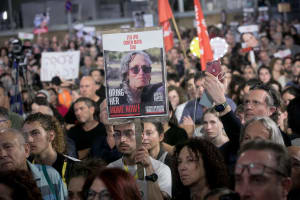Israeli hostages set to be released on Thursday, 10 a.m. as High Court rejects petition against the deal
Hezbollah says it may join 4-day ceasefire as more details about the deal emerge

Israel’s High Court on Wednesday afternoon rejected a petition against the agreement to free the Israeli hostages in the hands of Hamas, removing the last obstacle to the implementation of the deal on Thursday morning.
The petition against the deal was filed by the Almagor group, which is representing Israeli terror victims. In his decision, Justice Alex Stein backed the government’s authority to make a deal, which does not include all of the roughly 240 hostages that were kidnapped by Hamas on Oct. 7.
“This difficult matter is entirely in the realm of considerations of war and peace and foreign policy, which are in the hands of the government. This is a clear-cut policy issue which the court cannot address, something we have emphasized repeatedly in several rulings,” Stein wrote.
This means that the deal is set to go ahead from the Israeli side. According to Hamas, the first hostages will be released at 10 a.m., which is also the time the agreed-upon four-day ceasefire will kick in.
A Hezbollah source told Al Jazeera news that the organization would join the ceasefire, “if Israel is also committed to it. Any Israeli escalation in southern Lebanon in Gaza during a ceasefire will lead to a response.”
Beginning early on Thursday morning, IDF representatives will wait at several border crossings to receive the hostages as Hamas hasn’t announced where exactly they will be released yet, Army Radio reported.
The expected 10-13 women and children will then be flown via helicopter to several Israeli hospitals that have been prepared in advance to deal with the hostages. The released hostages will be kept at the hospital for medical and psychological treatment for at least 12 hours, according to the report.
Even though Israel will receive a list with the names of the hostages to be released each day, the IDF will only inform their families after receiving them and physically verifying their identity, so as not to raise the families’ hopes in vain.
The deal was approved by the government in a long and contentious meeting that began on Tuesday evening and stretched late into the night.
In the end, 35 ministers voted in favor, while only three ministers of the Jewish Power party voted against it.
Jewish Power party leader and National Security Minister Itamar Ben Gvir explained his decision to vote against the deal. He began by saying, “There is an advantage in the deal approved last night, that we will see some of the kidnapped children and women return home.”
“However, at the same time, we also have a moral obligation to return them all, and we have no right and authority to agree to the idea of separating them and returning only some. Obviously we can’t accept that as part of a deal that releases the terrorists and underage terrorists, we won’t receive all the women, children, IDF observers and anyone left in return,” Ben Gvir added.
Shas Party leader Aryeh Deri explained on Wednesday why such deal couldn’t be reached.
“We looked at a comprehensive deal. But it would’ve meant stopping the fighting, lifting the blockade and establishing a Palestinian state within the borders of '67. We will continue and bring Sinwar to a situation where he will have to release the others, as well,” Deri told Radio Kol Hai.
The ministers of the Religious Zionism party approved the deal, after publicly rejecting the outline of the agreement prior the meeting.
“The ministers of religious Zionism are convinced that this is an achievement that is in line with and promotes the overall goals of the war and… a deal that will lead to the release of many women and children, a limited move that includes clear mechanisms to prevent creeping erosion. Immediately after, the war will be renewed with determination and decisiveness,” the party said in a statement.

The All Israel News Staff is a team of journalists in Israel.
You might also like to read this:

















